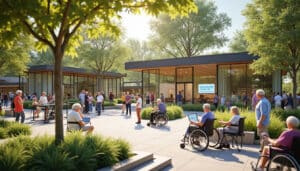Understanding the role of Alzheimer’s specialized teams (ESA) is essential for grasping the issues related to supporting individuals affected by Alzheimer’s disease. These teams, composed of qualified health professionals, intervene at home to promote the continuation of care at home for patients while supporting their relatives. The approach is multidisciplinary, aiming to preserve autonomy and improve the quality of life for those living with the disease, particularly in its mild or moderate stages. Exploring the missions, skills, and interventions of the ESA allows for a better understanding of their impact on the daily lives of seniors as well as on the well-being of their families.
The Alzheimer’s specialized teams, often abbreviated as ESA, are an essential system aimed at supporting individuals suffering from Alzheimer’s disease living at home. This neurodegenerative disease affects memory, thinking, and behavior, sometimes making it difficult to maintain an independent life. Thus, the ESA plays a major role in supporting these individuals and their families.
The ESA is composed of health professionals who are trained and experienced. These multidisciplinary teams include gerontology care assistants, psychomotor therapists, occupational therapists, and other specialists. Their main mission is to ensure both medical care and appropriate psychological support tailored to the needs of the patients. Thanks to their expertise, members of these teams can carry out targeted interventions to help affected individuals maintain maximum autonomy.
One of the essential challenges for the ESA is the continuation of care at home for the elderly. Indeed, many patients prefer to stay at home, where they feel safe and where their memories and references are rooted. The interventions carried out by these teams help preserve the patient’s independence while providing appropriate support. This includes activities for cognitive rehabilitation and exercises aimed at stimulating remaining abilities, which helps delay the progression of the disease.
The prescription of interventions by the Alzheimer’s specialized team is made on medical request. Doctors evaluate the situation of each patient and, depending on their condition, recommend the intervention of an ESA. This support process begins with a comprehensive assessment of the patient’s needs to anticipate a personalized action plan.
The ESA do not only work with patients, but they also provide valuable support to relatives. Living with a loved one affected by Alzheimer’s disease can be an emotional and psychological challenge. Specialized teams provide advice and resources to help families better understand the disease, manage difficult behaviors, and improve communication with the patient. This helps create a calm and adaptive family environment.
In addition to emotional support, Alzheimer’s specialized teams also conduct regular follow-ups to assess the patient’s progress and adjust interventions accordingly. These follow-ups are crucial to ensure that the patient receives the help they truly need. Furthermore, the continuous training of the professionals involved ensures that the practices and tools used are updated and effective.
Coordination among the different members of the Alzheimer’s specialized team is essential. Each professional brings their expertise, and together they build an integrated plan that meets the patient’s requirements. This optimized teamwork plays a key role in the effectiveness of the care provided.
In conclusion, understanding the missions and challenges of Alzheimer’s specialized teams is crucial. They are at the heart of a support system that values the continuation of care at home, preserves the autonomy of the elderly, and supports families. This comprehensive approach helps improve the quality of life for patients while addressing the challenges related to Alzheimer’s disease.

FAQ about the Alzheimer’s specialized team
What is an Alzheimer’s specialized team? An Alzheimer’s specialized team, or ESA, is a multidisciplinary system aimed at providing help and support to individuals affected by Alzheimer’s disease, particularly those living at home.
What are the objectives of interventions by Alzheimer’s specialized teams? The interventions by ESA aim to enable concerned individuals to stay at home for as long as possible while improving their quality of life and autonomy.
Who can benefit from the services of the Alzheimer’s specialized teams? The services of ESA are aimed at individuals diagnosed with mild to moderate stages of Alzheimer’s disease, as well as their relatives.
How does the intervention of an Alzheimer’s specialized team take place? The team visits the patient’s home to conduct rehabilitation sessions, which include activities aimed at stimulating cognitive abilities and assisting the patient in their daily life.
What professionals make up an Alzheimer’s specialized team? An ESA is generally composed of various professionals, such as gerontology care assistants, psychomotor therapists, and occupational therapists, who collaborate to provide comprehensive support.
How to access the services of an Alzheimer’s specialized team? Access to ESA is through medical prescription, which implies that a healthcare professional must recommend this type of care to benefit from it.
What are the benefits of an intervention by an Alzheimer’s specialized team? The main outcomes include improved autonomy for patients, psychological support for their relatives, and better management of daily living activities.











